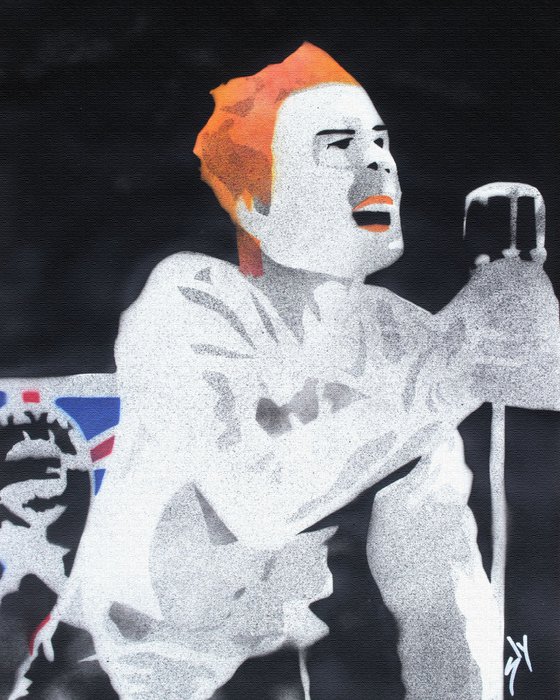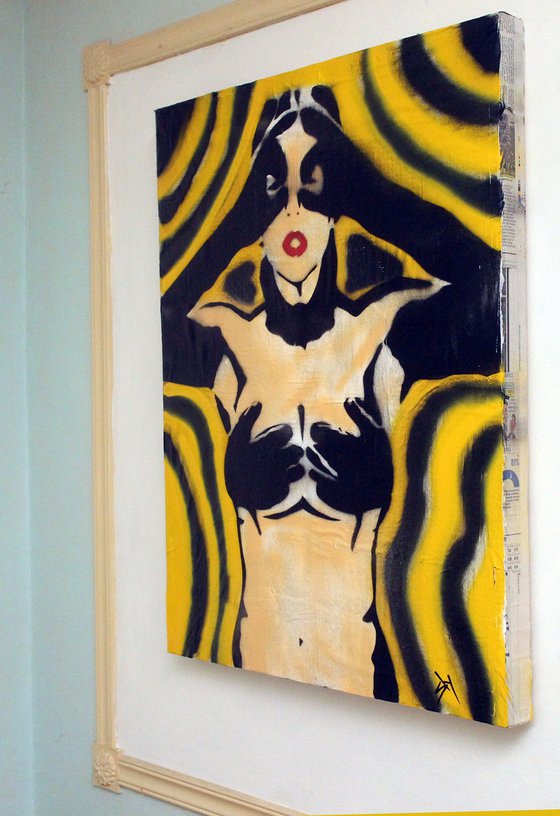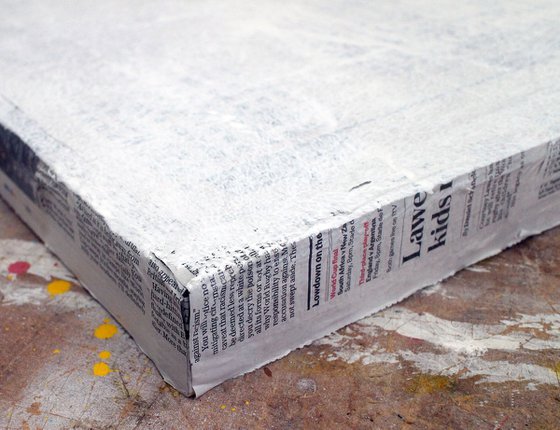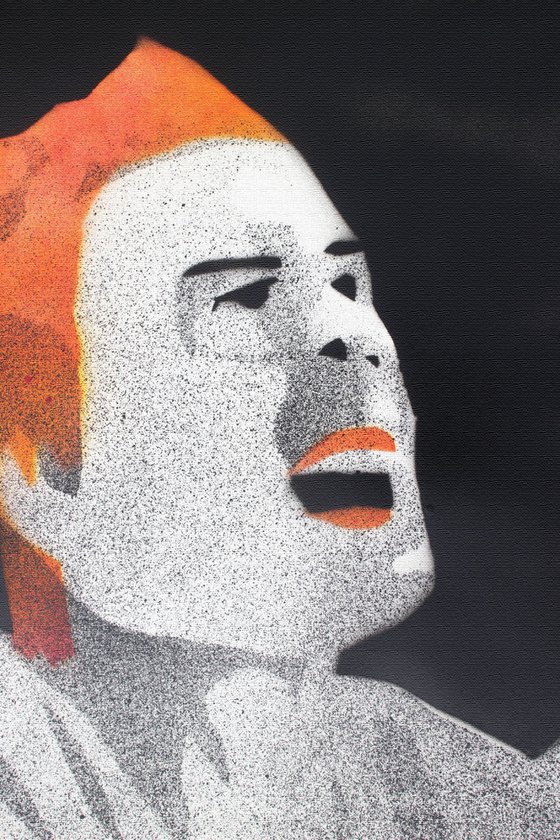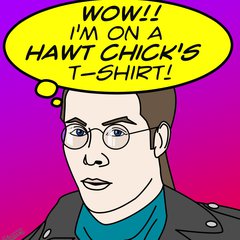- By medium
- By subject
- By budget
- Sales
- Gift cards
- Discover all art
- Artists
- Editors’ picks
- Ideas
Original artwork description:
Popiconic moment 4: "God save the Queen." (On an Urbox)
Urban Punk art in your own home by cult artist Sly.
God save the Queen, a single by the band, The Sex Pistols, struck out against the blind adoration and veneration of public figures, who since then have been progressively more exposed as “just in it for themselves” and a cosy club of self enrichment at the tax payer’s expense. So entrenched was the adoration that the record was initially refused to be pressed and the cover refused to be printed by the very type of people that the Band sought to liberate.
The cosy club eager not to be exposed banned the record from playing on the radio even though it broke no censorship rules, the Pistols were arrested for playing it even though it broke no laws and later had to be released without charge. The record was prevented from becoming number one through, devious behind the scene manipulation of figures, even though is outsold the “number one record” two-to-one. When finally it was acknowledged as number one, it was not played at the climax of the chart show as was normal. The abuse was not all clandestine; nearly all the band were viciously attacked in a number of incidents. Rotten boasted, "We're the only honest band that's hit this planet in about two thousand million years." Jones shrugged off everything the song stated and implied—or took nihilism to a logical endpoint: "I don't see how anyone could describe us as a political band. I don't even know the name of the Prime Minister." The song, and its public impact, are now recognized as "punk's crowning glory".
Juan Sly has taken this stencil from the very, first time Rotten sings “God Save the Queen” on national tele, a Popiconic moment, indeed.
Spiel By Steeve with additional material lifted from Wikipedia.
These are not prints, as each is individually painted and signed to order and consequently will vary slightly from the illustrated picture. These paintings are sprayed onto a handmade "Urbox,” or urban box, covered in newspaper cuttings and are handmade by people who wish to work to supplement their income. The boxes measure 590x760x45 mm, look really cool, have an urban feel, and are ready to hang, so there is no need to buy an expensive frame.
(Also available on The Daily Telegraph, watercolour paper or plain paper at various prices if you search elsewhere.)
Juan Sly is likely the biggest seller of original artwork in the UK. An artist exhibiting in spray stencils, newspaper and oils, he has exhibited at the Saatchi (a proper gallery with pillars and everything!) alongside the likes of Banksy, Terry O'Neil, Tracy Emin and Vic Reeves, and has permanent collections in Ireland, Detroit and England, alongside Damien Hirst and some other artists you might have heard of, plus private collections around the globe. His works rock from humour to anti-war, sex to surreal. He is particularly fond of the stencil medium as it allows him to respond quickly to events and ideas and gives his works a gritty, illegal look. The stencils naturally allow the works to be resprayed, and consequently become affordable and disposable. He likes the fact that people can buy art which they like, and not to show off how much they can afford. You can find them in bedsits, legal offices in the Temple or stuck to a fence in Bristol.
Spiel by Steeve.
Materials used:
Spray on box 59x76x4cm
Tags:
#music #spray #popart #pop #rock.stencilPopiconic moment 4. (U) (2024) Spray paint painting
by Juan Sly
395 Artist Reviews
£50
- Spray paint painting on Other
- One of a kind artwork
- Size: 59 x 76 x 4cm
- Ready to hang
- Signed on the front
- Style: Urban and Pop
- Subject: People and portraits
Loading
Original artwork description
Popiconic moment 4: "God save the Queen." (On an Urbox)
Urban Punk art in your own home by cult artist Sly.
God save the Queen, a single by the band, The Sex Pistols, struck out against the blind adoration and veneration of public figures, who since then have been progressively more exposed as “just in it for themselves” and a cosy club of self enrichment at the tax payer’s expense. So entrenched was the adoration that the record was initially refused to be pressed and the cover refused to be printed by the very type of people that the Band sought to liberate.
The cosy club eager not to be exposed banned the record from playing on the radio even though it broke no censorship rules, the Pistols were arrested for playing it even though it broke no laws and later had to be released without charge. The record was prevented from becoming number one through, devious behind the scene manipulation of figures, even though is outsold the “number one record” two-to-one. When finally it was acknowledged as number one, it was not played at the climax of the chart show as was normal. The abuse was not all clandestine; nearly all the band were viciously attacked in a number of incidents. Rotten boasted, "We're the only honest band that's hit this planet in about two thousand million years." Jones shrugged off everything the song stated and implied—or took nihilism to a logical endpoint: "I don't see how anyone could describe us as a political band. I don't even know the name of the Prime Minister." The song, and its public impact, are now recognized as "punk's crowning glory".
Juan Sly has taken this stencil from the very, first time Rotten sings “God Save the Queen” on national tele, a Popiconic moment, indeed.
Spiel By Steeve with additional material lifted from Wikipedia.
These are not prints, as each is individually painted and signed to order and consequently will vary slightly from the illustrated picture. These paintings are sprayed onto a handmade "Urbox,” or urban box, covered in newspaper cuttings and are handmade by people who wish to work to supplement their income. The boxes measure 590x760x45 mm, look really cool, have an urban feel, and are ready to hang, so there is no need to buy an expensive frame.
(Also available on The Daily Telegraph, watercolour paper or plain paper at various prices if you search elsewhere.)
Juan Sly is likely the biggest seller of original artwork in the UK. An artist exhibiting in spray stencils, newspaper and oils, he has exhibited at the Saatchi (a proper gallery with pillars and everything!) alongside the likes of Banksy, Terry O'Neil, Tracy Emin and Vic Reeves, and has permanent collections in Ireland, Detroit and England, alongside Damien Hirst and some other artists you might have heard of, plus private collections around the globe. His works rock from humour to anti-war, sex to surreal. He is particularly fond of the stencil medium as it allows him to respond quickly to events and ideas and gives his works a gritty, illegal look. The stencils naturally allow the works to be resprayed, and consequently become affordable and disposable. He likes the fact that people can buy art which they like, and not to show off how much they can afford. You can find them in bedsits, legal offices in the Temple or stuck to a fence in Bristol.
Spiel by Steeve.
Materials used:
Spray on box 59x76x4cm
Tags:
#music #spray #popart #pop #rock.stencil14 day money back guaranteeLearn more
